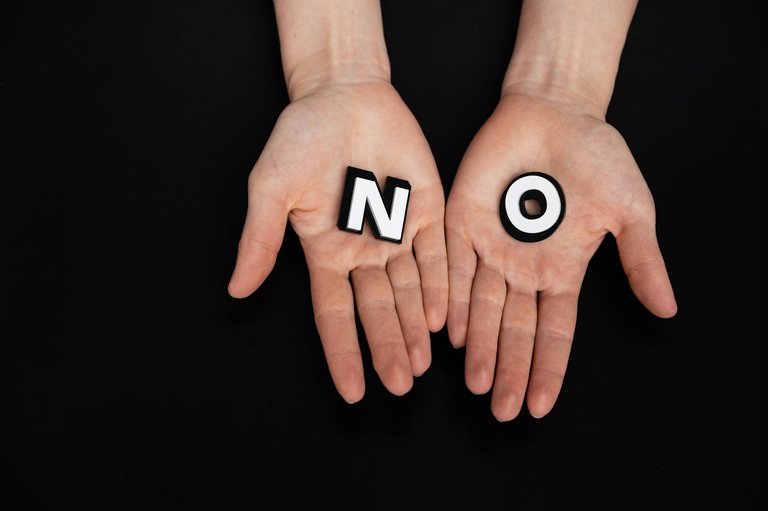Concept and art of saying no

NO could be termed a disapproval for an act or intention, often by a superior individual to a junior or even by self towards an act. Saying no is the negation attached to acts or intentions, a contrary opinion to an act.
Everyone is entitled to say no based on the individual's perception or judgement. Even the little kids say no to adults, and society could be termed saying no to acts of wrongdoing. However, saying no goes beyond a one-time occurrence as it relates to being an art.
This is difficult to apply because oftentimes, a feeling is being hurt when we say no. Saying no can be to anybody if the context to which our disapproval is within the right judgment or perceptions. Saying no often comes from a divergent perception of a line of thought. For example, you could be asked to carry a weight, which even though you could eventually carry but may cause some complications afterward.
This is one of the topmost acts of discipline anyone can attain. Saying no to oneself is a significant prerequisite to saying no to others. If you, as an individual, can deny yourself, then you probably can deny any other person. Saying no to oneself is often intentional and difficult but necessary. The human mind is unlimited in its wants, always desirous to live maximally, and unless tamed and cautioned, could plunge the bearer into a retrograde lifestyle and an unhappy state of little or no accomplishments. At some points in our lives, we have had to deny ourselves some frivolity in prospect of a greater good. Parents deny themselves of lifestyles they could afford if the children were not in picture. Learning to deny oneself is a step towards contentment and a life of minimalism.
The art of saying no adds discipline to oneself, which must be protected within the context of limits so as not to deny oneself the very basics of life in a bid to stay disciplined. The more we are able to say no to things that are unnecessary to us, the more likely our paths in life will be easy.

A colleague of mine asked me how easy it was for me to say no to an individual who had called for financial assistance. My response may have seemed harsh since it was said outright, but it was genuine, and thus I felt no regrets. "I don't even have funds for myself, how can the helpless help another?" This was my response to my colleague. Yet again, we have people who are unable to help or say no to others but, because they do not want to sound harsh or for other reasons, tend to render false hope to those in need. Even though this looks better, the false hope on the one who asked and equally the weight and torture of needing to find help for another by the responder are avoidable.
Saying no to others also means one is vast and confident about the position upheld. There are times we have to say no to wrong notions, ideas, or even acts that may come from juniors, colleagues, or even superiors. It would be unwise to say no to what is right and beneficial to society. Saying no should be with facts and evidence, and the construct of words should be polite and gentle. Yet, there are circumstances that warrant an immediate negative response, such as acts of wrongdoing.
During my early years of professional practice, a nurse called me to a corner and corrected my practice during a ward round. I was glad for many reasons. She had not rebuked me openly. Also, despite being superior to her, she had the courage to correct me, and lastly, I had learned to practice right. Notwithstanding, there are occasions we have to say no to acts of wrongdoing. I remember having to speak up against a manager at a fuel station during one of the many times of fuel scarcity in Nigeria. I was the youngest among my colleagues, and we had been exhausted before then. Thus, we all agreed to pour our minds to the manager if they practiced their usual way of wrong entry. I was shocked to find myself alone speaking up when another wrongdoing was perpetrated. Then, I realized some fronts are better stood alone.

Many times, those who have embraced the art of saying no have had their emotions under check such that the remorse or feeling of guilt does not haunt them. The world cannot be saved, and it is crucial to identify how much help we can render. Sometimes, one may have to keep silent in the face of injustice, a pain we have to bear in our hearts. Other times, saying no could be termed an act of insubordination or disrespect; thus, wisdom is essential when we have to say no to acts or intentions.
You are welcome to participate in the monthly and daily #inleo prompt HERE
Thank you for reading through. I would love to have your contents and contributions.
Posted Using InLeo Alpha
Saying no is something everyone should muster the courage do else people will ride on us like horses.
You're right, we must learn to resist what people would say.